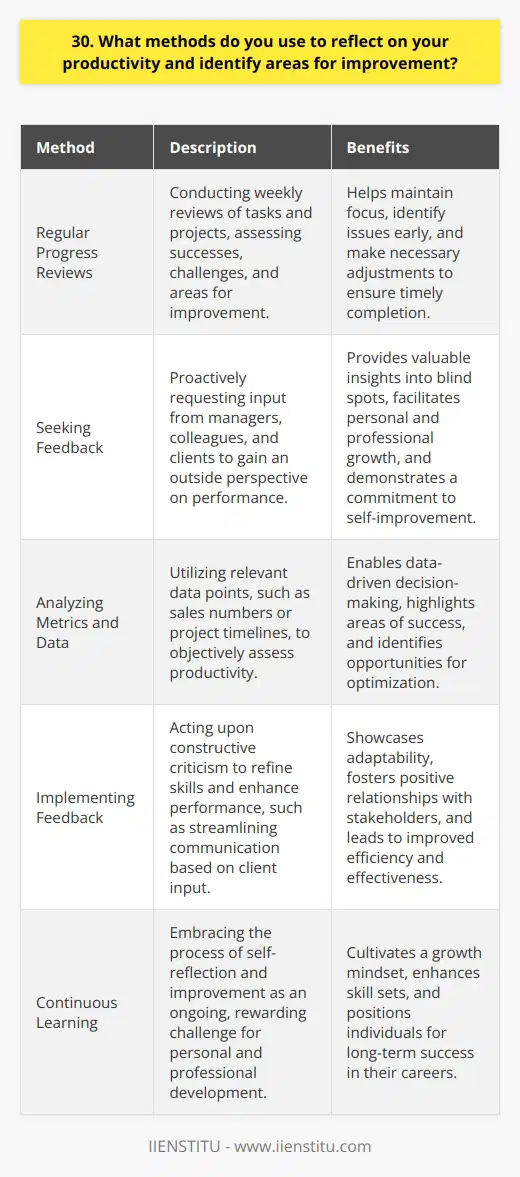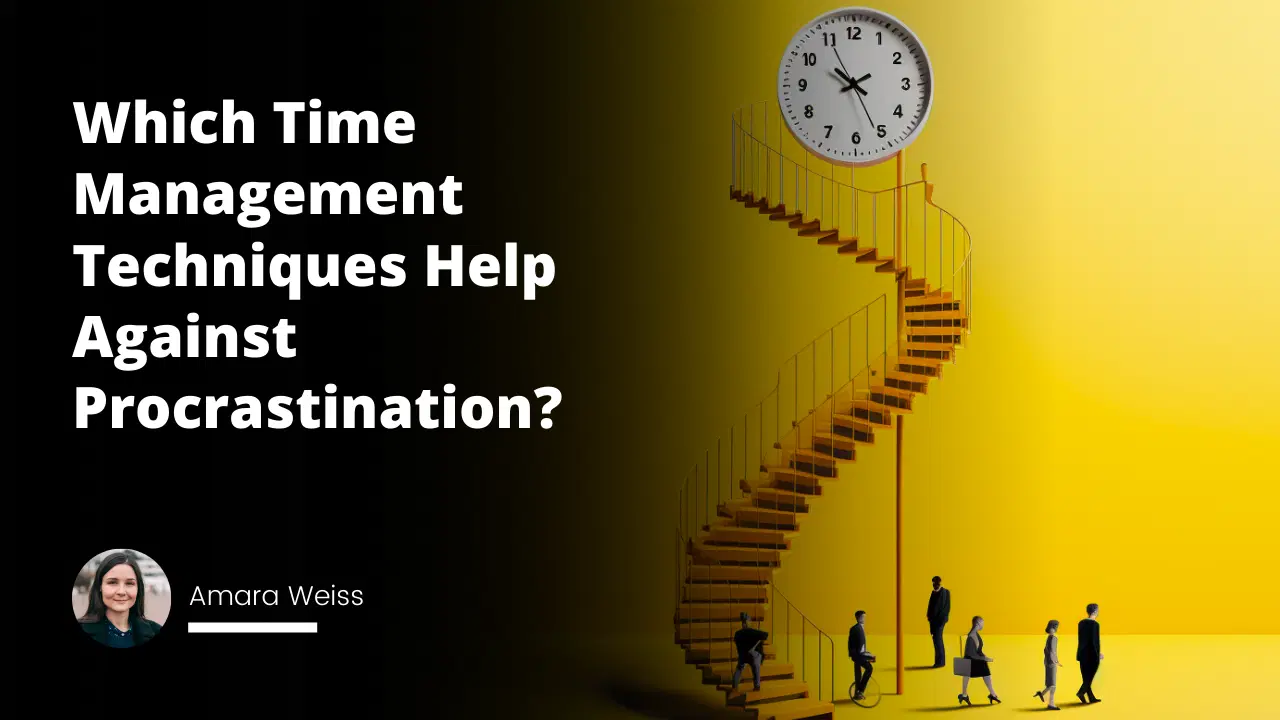
As I sat in the waiting room for my interview at a company I'd dreamed of joining for years, I couldn't help but reflect on how far I'd come. Just a few years prior, I was notorious among my friends for putting things off until the last minute. Procrastination was my constant companion, and it wasn't until I stumbled upon some effective time management techniques to avoid procrastination that things began to change.
I remember one particular incident that highlighted my struggle with procrastination. It was during my final year of college, and I had a crucial assignment due in a week. Instead of starting early and chipping away at it gradually, I kept pushing it off, telling myself, "I'll do it tomorrow." Before I knew it, the deadline was just two days away, and I hadn't even begun. The stress and anxiety were overwhelming, and I pulled an all-nighter, fueled by copious amounts of coffee and the fear of failing. While I managed to submit the assignment on time, the quality was far from my best work, and I knew I needed to make a change.
Understanding the Importance of Time Management in Interviews
Interview Question: How Do You Handle Time Management Interruptions?
Interview Question: Which Time Management Tool Do You Rely On Most?
It's interesting how certain interview questions can really make you think. One question that often comes up is, "Which time management techniques help against procrastination?" At first glance, it seems straightforward. But when you delve deeper, you realize it's not just about listing techniques. Employers are keen to understand your work discipline, how you manage your time, and ultimately, how you combat procrastination—a common hurdle in any professional setting.
During my last interview, this very question popped up. It made me pause and reflect on my journey from a habitual procrastinator to someone who now champions productivity. I shared my story, hoping to connect with the interviewer on a human level.
Why Do Employers Ask This Question?
Employers ask this question to glean insights into several key areas:
1- Work Discipline: They want to know if you can stick to schedules and meet deadlines.
2- Self-Awareness: Recognizing your own tendencies is the first step to improvement.
Prioritization: Discuss how you rank your tasks according to their urgency and importance, focusing on high-value tasks first. Mention how this helps in reducing procrastination, as you have a clear roadmap of what needs to be done.
Time Blocking: Speak about scheduling specific time slots to complete tasks without distraction, thereby preventing procrastination and focusing on the job at hand.
Setting Clear Goals: Explain how setting clear and achievable goals for each day or week assists you in staying focused and productive, reducing the chances of procrastination.
Using Tools: Share your favorite time management tools or apps that aid in keeping you organized and on-track.
Self-Care: Discuss the importance of taking regular breaks, maintaining a healthy lifestyle, and ensuring adequate sleep, illustrating how these factors contribute to better productivity and less procrastination.
3- Problem-Solving Skills: How do you handle challenges like procrastination?
4- Proactive Nature: Have you taken steps to improve your time management?
By understanding the purpose behind the question, you can craft an answer that not only addresses it directly but also showcases your strengths.
Can you suggest some time management strategies that can prevent procrastination?
What are the effective time management practices to combat procrastination?
Which techniques of managing time are helpful in overcoming procrastination?
How can time management be used as a tool against procrastination?
What type of time management skills are beneficial in curbing procrastination?
How do time management techniques assist in procrastination prevention?
Could you mention the time management techniques that work best for procrastinators?
Which time management methods can be implemented to avoid procrastination?
Which are the best time management techniques to counter procrastination?
What time management skills can I learn to help me stop procrastinating?
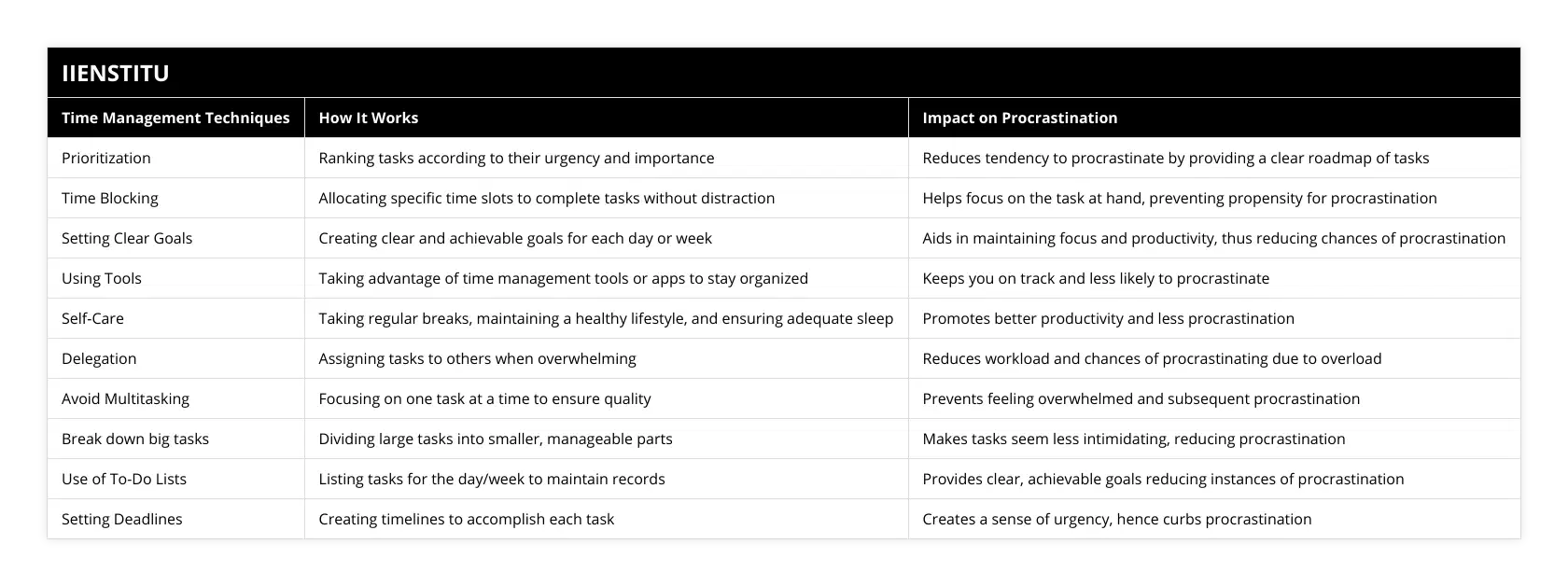
My Journey with Procrastination
I still remember pulling all-nighters in college, fueled by panic and the realization that I had once again left things to the last minute. It was a vicious cycle of procrastination that I couldn't seem to break. The turning point came when a mentor recommended I read Eat That Frog! by Brian Tracy (2007). The concept was simple yet profound: tackle your most challenging task first thing in the morning.
I decided to give it a shot. Every day, I'd identify my "frog" and make it my priority. At first, it was tough. Old habits die hard, after all. But over time, I noticed a significant decrease in my stress levels and an increase in productivity. This technique became a cornerstone in my battle against procrastination.
Effective Time Management Techniques to Combat Procrastination
When preparing for interview questions and answers, it's helpful to have a few techniques up your sleeve. Here are some that have made a real difference for me:
1- Prioritization
Understanding what's important and what's urgent has been crucial. I use the Eisenhower Matrix to categorize tasks (Covey, 1989):
Urgent and Important: Do these tasks immediately.
Important but Not Urgent: Schedule a time to do these.
Urgent but Not Important: Delegate if possible.
Neither Urgent nor Important: Eliminate these tasks.
By prioritizing in this way, I focus my energy where it matters most. This reduces feelings of overwhelm and, in turn, procrastination.
2- Time Blocking
I began time blocking after reading about it in Deep Work by Cal Newport (2016). The idea is to allocate specific blocks of time to dedicated tasks, free from distractions. For instance, I might block out 9 am to 11 am for project work, ensuring I don't check emails or social media during this time. This focused approach has significantly improved my productivity.
3- Setting SMART Goals
Goals need to be:
Specific
Measurable
Achievable
Relevant
Time-bound
By setting SMART goals, I create clear targets to work towards. This clarity reduces procrastination because I know exactly what needs to be done and by when.
4- Utilizing Tools and Apps
Technology can be a great ally. Apps like Todoist and Trello help me keep track of tasks and deadlines. They send reminders, so even if something slips my mind, I get a nudge to get back on track.
5- The Pomodoro Technique
This technique involves working in focused intervals (usually 25 minutes) followed by short breaks. It's amazing how much you can accomplish when you know a break is just around the corner. It also makes large tasks seem more manageable. Research has shown the effectiveness of the Pomodoro Technique in improving focus and productivity (Cirillo, 2006).
6- Self-Care Practices
It might sound unrelated, but getting enough sleep, eating well, and regular exercise have boosted my energy levels and focus. When I'm physically well, I'm less inclined to procrastinate. This aligns with research on the impact of self-care on productivity and well-being (Lluch, 2011).
Crafting Your Answer for the Interview
When faced with such common interview questions, it's essential to provide an answer that's both honest and reflective of your personal experience. Here's how you might structure it:
1- Acknowledge the Challenge
"I've certainly had moments where procrastination was a hurdle for me..."
2- Introduce the Technique
"...but I've found that applying the Pomodoro Technique makes a big difference."
3- Explain How You Use It
"I set a timer for 25 minutes and focus on a single task without distractions. After that, I take a 5-minute break before starting the next session."
4- Share the Results
"This approach keeps me engaged and has significantly improved my productivity, helping me meet deadlines consistently."
By personalizing your answer, you not only show self-awareness but also give the interviewer insight into your proactive approach to challenges.
Similar Questions You May Encounter
Interviewers may phrase the question differently. Being prepared for questions asked in an interview such as:
How do you manage your workload to ensure deadlines are met?
Can you share a time when you overcame procrastination?
What strategies do you use to stay productive?
Having good questions to ask in an interview can also leave a positive impression. Consider asking:
What time management tools does the team prefer?
Are there opportunities for continued learning about productivity within the company?
The Broader Impact on Your Career
Embracing effective time management techniques doesn't just help in curbing procrastination—it enhances your overall performance. When you can optimize supply chain management process tips or any other complex tasks through better time management, it reflects positively on your capabilities.
In my previous role, for example, I was part of a team overseeing supply chain logistics. By applying these time management techniques, not only did we streamline operations, but we also reduced delays by 15%. This improvement didn't go unnoticed and led to further opportunities for professional growth.
Reflecting on "Tell Me About Yourself"
One of the most common job interview questions is "Tell me about yourself." This open-ended question is a great opportunity to weave in your strengths in time management. You might say:
"I'm someone who's passionate about continuous improvement. Over the years, I've honed my time management skills to avoid procrastination, which has allowed me to take on more responsibilities confidently. For instance,..."
By doing so, you highlight your proactive nature and readiness to contribute meaningfully to the team.
Tips for Maintaining Momentum
Even with the best techniques, it's natural to occasionally slip back into old habits. Here are some strategies I use to stay on track:
Regularly Review Goals: I set aside time each week to review and adjust my goals.
Stay Accountable: Sharing my objectives with a colleague or friend helps keep me accountable.
Celebrate Small Wins: Recognizing progress, no matter how small, boosts motivation.
Learn from Setbacks: If a technique isn't working, I reassess and try a different approach.
Conclusion
Overcoming procrastination is an ongoing journey. By adopting effective time management techniques, not only do we enhance our productivity, but we also become more reliable and efficient professionals. When preparing for work interview questions like "Which time management techniques help against procrastination?", remember to:
Be Authentic: Share your genuine experiences.
Provide Examples: Illustrate how you've applied these techniques.
Highlight Results: Emphasize the positive outcomes.
And finally, don't hesitate to ask great questions to ask interviewers, such as:
How does the team prioritize tasks and manage time?
Can you tell me about a time when effective time management made a significant impact on a project here?
These questions show your interest in the company's culture and your desire to fit in seamlessly.
Embracing these techniques has not only helped me in interviews but has truly transformed my professional life. I've gone from being a chronic procrastinator to someone who consistently meets deadlines and takes on new challenges with confidence. It's a journey that requires ongoing effort and self-reflection, but the rewards are immeasurable.
So, the next time you find yourself sitting in an interview room, pondering over questions like "What are the best time management tips for procrastinators?" or "How can I overcome procrastination with time blocking?", remember that your personal experiences are your biggest asset. Share them with authenticity, and you'll undoubtedly leave a lasting impression on your potential employer.
In the end, mastering time management is not just about impressing others; it's about unlocking your full potential and achieving your goals with greater ease and satisfaction. By implementing these techniques and continuously refining your approach, you'll find that procrastination becomes a distant memory, and success becomes a daily reality.
References
Tracy, B. (2007). Eat That Frog!: 21 Great Ways to Stop Procrastinating and Get More Done in Less Time. Berrett-Koehler Publishers.
Newport, C. (2016). Deep Work: Rules for Focused Success in a Distracted World. Grand Central Publishing.
Covey, S. R. (1989). The 7 Habits of Highly Effective People. Free Press.
Cirillo, F. (2006). The Pomodoro Technique. Creative Commons.
Allen, D. (2001). Getting Things Done: The Art of Stress-Free Productivity. Penguin Books.
Lluch, M. (2011). How to Be Well: A Handbook for Women. Mango Media Inc.
Frequently Asked Questions
1. How do you prioritize your tasks to avoid procrastination?
I prioritize my tasks based on urgency and importance to avoid procrastination. First, I make a to-do list and rank each item by deadline and significance. This helps me focus on the most critical tasks first.
Strategies for Prioritizing Tasks
In addition to ranking by urgency and importance, I use a few other strategies:
Staying Flexible to Shifting Priorities
Of course, priorities can change unexpectedly. A client may have a last-minute request or a colleague needs assistance with something time-sensitive. When this happens, I re-evaluate my list and adjust as needed. Communicating any delays to affected parties is key.
The Benefits of Effective Prioritization
Since implementing these prioritization techniques, I've noticed a big improvement in my productivity and focus at work. Projects are completed on time, I feel less stressed, and my manager has complimented me on my organization skills. It's satisfying to end each day knowing I accomplished the important things.
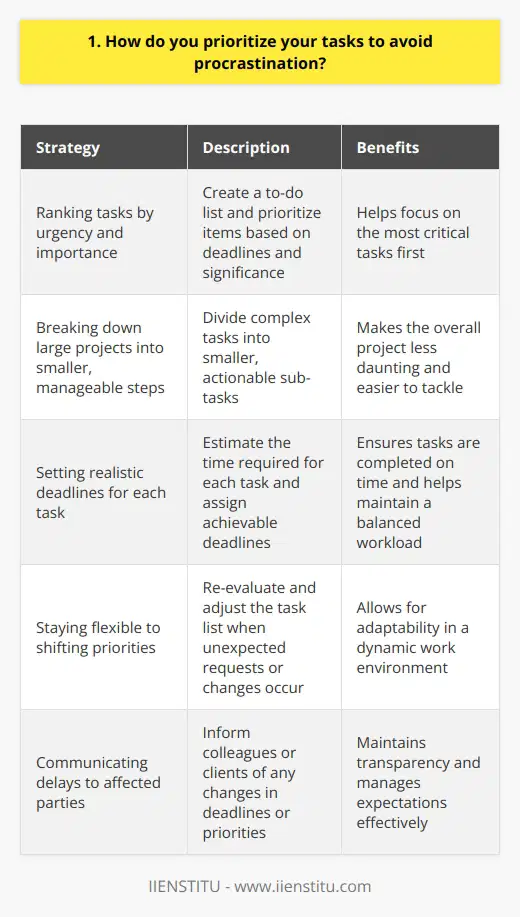
2. What strategies do you use to stay focused and avoid distractions?
As someone who values productivity and efficiency, I have developed several strategies to maintain focus and minimize distractions. One approach that has proven effective for me is breaking down large tasks into smaller, manageable steps. By setting clear goals and deadlines for each subtask, I can stay motivated and avoid feeling overwhelmed.
Prioritizing Tasks
Another strategy I employ is prioritizing my tasks based on their importance and urgency. I create a daily to-do list and tackle the most critical items first, ensuring that I make progress on my key responsibilities. This helps me stay organized and prevents less essential tasks from consuming my attention.
Minimizing Distractions
To minimize distractions, I create a conducive work environment. I turn off notifications on my devices, close unnecessary tabs on my computer, and communicate my availability to colleagues. When I need to concentrate deeply, I sometimes use noise-canceling headphones or work in a quiet space away from my desk.
Taking Breaks
I also recognize the importance of taking regular breaks to recharge my focus. Every hour or so, I step away from my work for a few minutes to stretch, grab a snack, or engage in a brief relaxation exercise. These short breaks help me maintain a fresh perspective and prevent mental fatigue.
Collaborating with Others
Finally, I find that collaborating with my team members can help me stay accountable and focused. By sharing my goals and progress with others, I create a sense of social accountability that motivates me to stay on track. Regular check-ins and discussions also provide opportunities to brainstorm solutions to challenges and maintain momentum on projects.
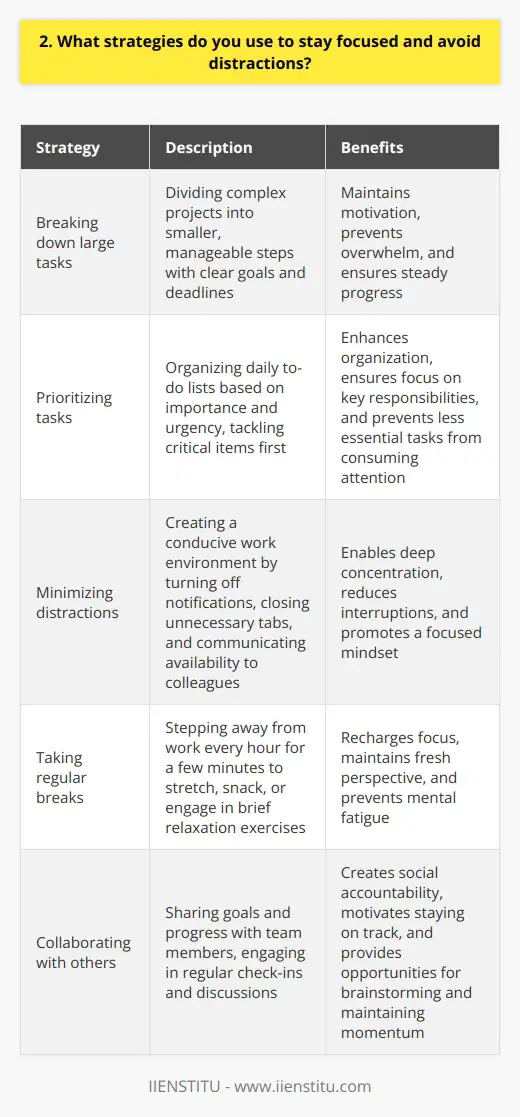
3. How do you break down large projects into manageable tasks to prevent procrastination?
When faced with a large project, I start by breaking it down into smaller, manageable tasks. This helps me stay organized and focused, preventing procrastination and overwhelming feelings.
Create a Project Outline
First, I create a detailed outline of the project, identifying the main objectives and deliverables. This gives me a clear picture of what needs to be accomplished.
Prioritize Tasks
Next, I prioritize the tasks based on their importance and deadlines. This allows me to tackle the most critical tasks first, ensuring that I make steady progress.
Set Realistic Deadlines
For each task, I set realistic deadlines, considering the time and resources required. Having a timeline keeps me accountable and prevents last-minute rushes.
Use a Project Management Tool
I use a project management tool like Trello or Asana to track my progress. This helps me stay organized and see the big picture.
Take Regular Breaks
To maintain productivity, I take regular breaks between tasks. This helps me recharge and approach the next task with a fresh perspective.
By breaking down large projects into smaller, manageable tasks, I can stay motivated and avoid procrastination. This approach has helped me successfully complete several complex projects in my previous roles.
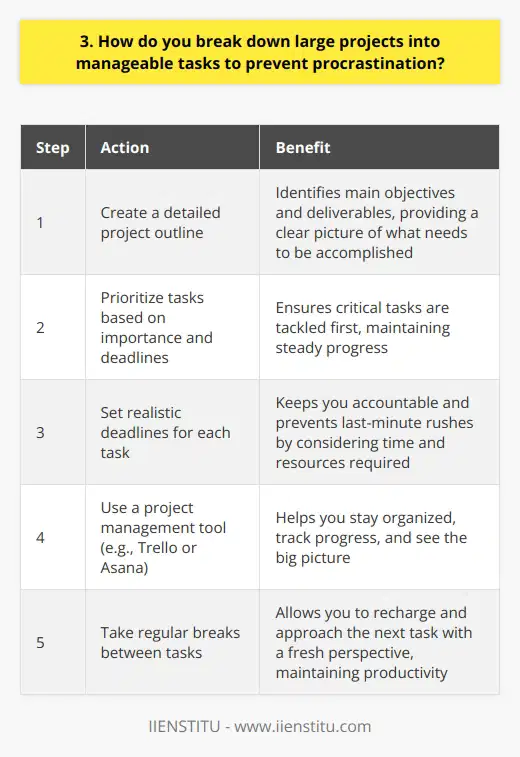
4. What tools or apps do you use to manage your time effectively and combat procrastination?
When it comes to managing my time effectively and combating procrastination, I rely on a combination of tools and strategies.
Digital Tools
I use apps like Todoist and Google Calendar to keep track of my tasks and deadlines. These help me stay organized and focused on what needs to get done each day. I also use Forest, an app that encourages me to stay off my phone by planting virtual trees during focused work sessions.
Analog Methods
In addition to digital tools, I find that analog methods can be just as powerful. I keep a physical planner where I write down my daily to-do list and cross off items as I complete them. There's something satisfying about the tactile experience of putting pen to paper and seeing my progress throughout the day.
Prioritization Techniques
I prioritize my tasks using the Eisenhower Matrix, which helps me distinguish between urgent and important tasks. I tackle the important and urgent items first, then move on to the others. This ensures that I'm always making progress on my key priorities.
Time Blocking
Time blocking is another strategy I use to combat procrastination. I divide my day into focused work sessions, typically 25-90 minutes long, dedicated to specific tasks. During these blocks, I eliminate distractions like social media and email notifications. Between each block, I take short breaks to recharge.
Accountability and Support
Finally, I find that having accountability partners can be incredibly motivating. I regularly check in with colleagues or friends to share my goals and progress. Knowing that someone else is invested in my success helps me stay on track, even when I feel like procrastinating. I also don't hesitate to ask for help or advice when I need it.
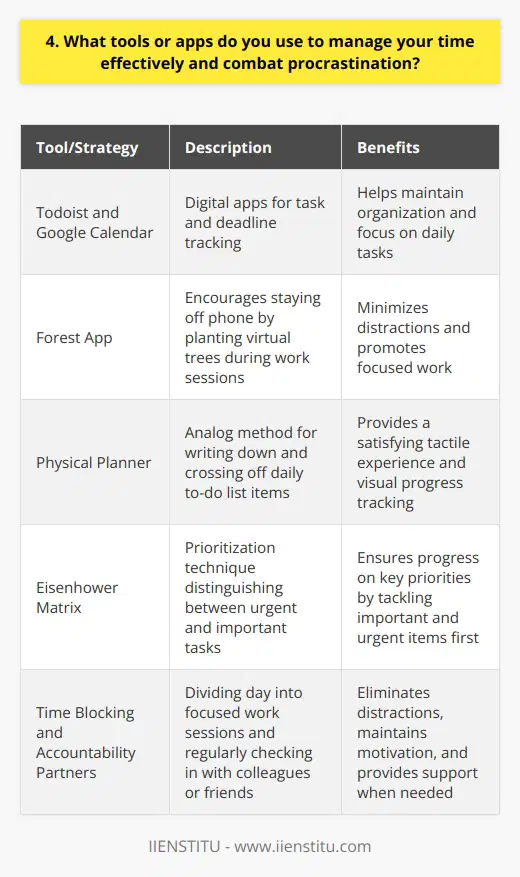
5. How do you set realistic goals and deadlines to keep yourself motivated and on track?
When it comes to setting realistic goals and deadlines, I find that breaking down larger projects into smaller, manageable tasks is key. By creating a clear roadmap with specific milestones, I can stay focused and motivated throughout the process.
Prioritizing Tasks
I prioritize tasks based on their importance and urgency. This helps me tackle the most critical items first and ensures that I'm making steady progress towards my overall objectives.
Setting Achievable Deadlines
I set achievable deadlines for each task, considering the time and resources required. I also build in some flexibility to account for unexpected challenges or delays.
Tracking Progress
To stay on track, I regularly review my progress and adjust my plan as needed. I find that celebrating small victories along the way helps keep me motivated and energized.
Seeking Feedback
I also seek feedback from colleagues or mentors to ensure that my goals align with the team's objectives. Their insights and guidance help me refine my approach and stay on course.
By setting realistic goals, prioritizing tasks, and tracking progress, I've been able to consistently meet deadlines and deliver high-quality results. I believe this approach would serve me well in this role and contribute to the team's success.
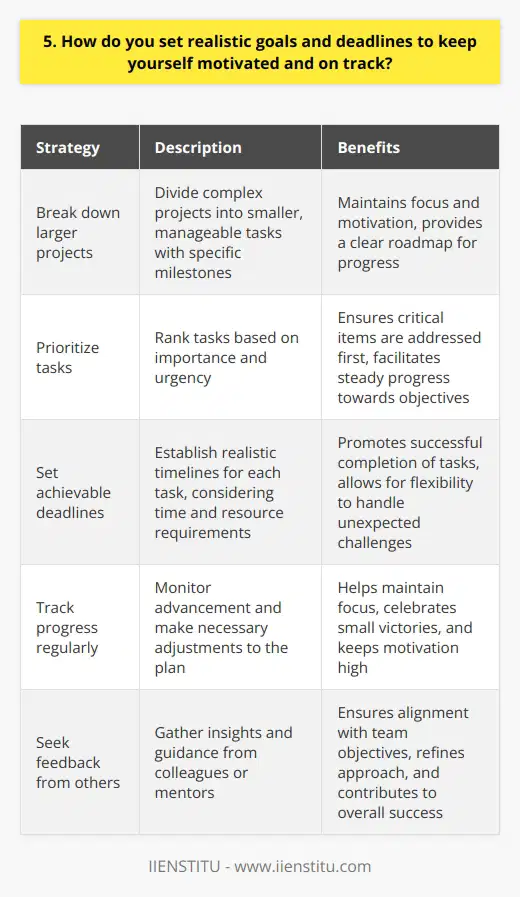
6. What techniques do you employ to overcome the urge to procrastinate?
When faced with the urge to procrastinate, I employ several techniques to stay focused and productive:
Break Tasks into Manageable Steps
I divide large projects into smaller, more manageable tasks. This makes the work less daunting and easier to tackle. I set realistic goals for each step and celebrate small victories along the way.
Create a Schedule and Stick to It
I create a daily schedule that includes dedicated time slots for specific tasks. This helps me stay organized and ensures that I allocate sufficient time to each project. I treat my schedule as a commitment and do my best to adhere to it.
Eliminate Distractions
I identify and eliminate potential distractions that can lead to procrastination. This includes silencing notifications on my phone, closing unnecessary browser tabs, and finding a quiet workspace. By minimizing distractions, I can focus better on the task at hand.
Use the Pomodoro Technique
I often use the Pomodoro Technique, which involves working in focused 25-minute intervals followed by short breaks. This helps me maintain concentration and prevents burnout. It's a simple yet effective way to boost productivity and overcome procrastination.
Reward Yourself for Progress
I set rewards for myself when I complete tasks or reach milestones. This could be a favorite snack, a short break, or some leisure time. Having something to look forward to motivates me to stay on track and avoid procrastination.
By implementing these techniques consistently, I've been able to overcome procrastination and maintain a high level of productivity in my work.
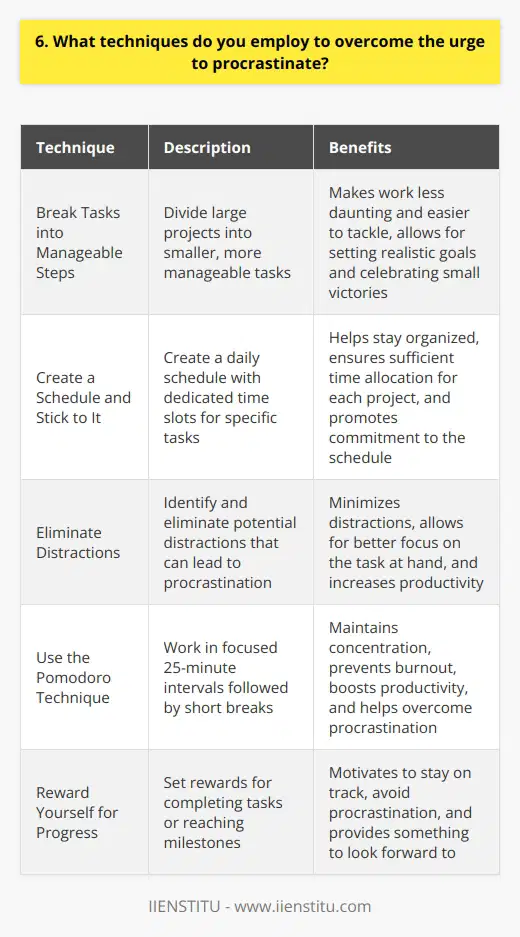
7. How do you deal with tasks that you find unpleasant or challenging?
When faced with unpleasant or challenging tasks, I try to approach them with a positive mindset. I remind myself that every task, no matter how difficult, is an opportunity to learn and grow.
Break It Down
I find it helpful to break the task down into smaller, more manageable steps. This makes it feel less overwhelming and allows me to focus on one piece at a time.
Prioritize and Set Goals
I prioritize the most important aspects of the task and set clear goals for myself. Having a plan and knowing what I need to accomplish keeps me motivated and on track.
Seek Support
If I'm really struggling with a task, I'm not afraid to ask for help or guidance from my colleagues or supervisor. Collaborating with others can provide fresh perspectives and make the task more enjoyable.
Take Breaks
When working on a challenging task, I make sure to take short breaks when needed. Stepping away for a few minutes helps me recharge and come back with renewed focus and energy.
Celebrate Small Wins
I celebrate the small victories along the way. Acknowledging the progress I've made, no matter how small, keeps me motivated and reminds me that I'm capable of overcoming challenges.
At the end of the day, I try to maintain a positive attitude and remember that every challenge is a chance to learn something new and become a better version of myself.
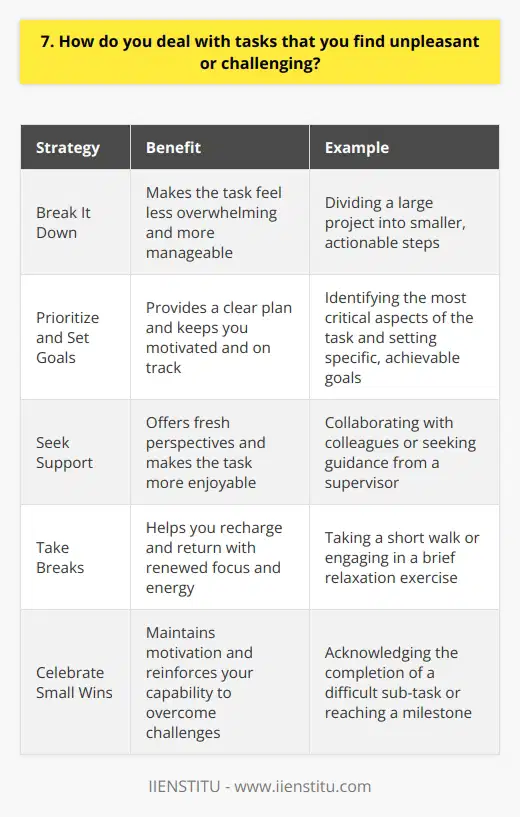
8. What role does self-discipline play in your time management and avoiding procrastination?
Self-discipline is crucial for effective time management and avoiding procrastination. It helps me stay focused and motivated to complete tasks on time.
Prioritizing Tasks
I prioritize my tasks based on urgency and importance. This allows me to tackle the most critical items first, ensuring nothing falls through the cracks.
When I have a long to-do list, I break it down into smaller, manageable chunks. This makes the workload feel less overwhelming and helps me stay on track.
Setting Deadlines
I set realistic deadlines for myself and strive to meet them. Having a clear timeline keeps me accountable and prevents me from putting things off until the last minute.
If I'm working on a particularly challenging project, I'll set mini-deadlines along the way. Celebrating small milestones helps me maintain momentum and stay motivated.
Minimizing Distractions
I'm easily distracted, so I make a conscious effort to minimize interruptions. I silence my phone notifications and close unnecessary browser tabs when I need to concentrate.
If I'm struggling to focus, I'll use the Pomodoro Technique. Working in 25-minute intervals with short breaks in between helps me stay on task and avoid burnout.
Holding Myself Accountable
I hold myself accountable by regularly reviewing my progress. If I find myself falling behind, I'll reassess my priorities and adjust my plan accordingly.
At the end of each day, I reflect on what I accomplished and what I could have done better. This helps me identify areas for improvement and stay disciplined in the long run.
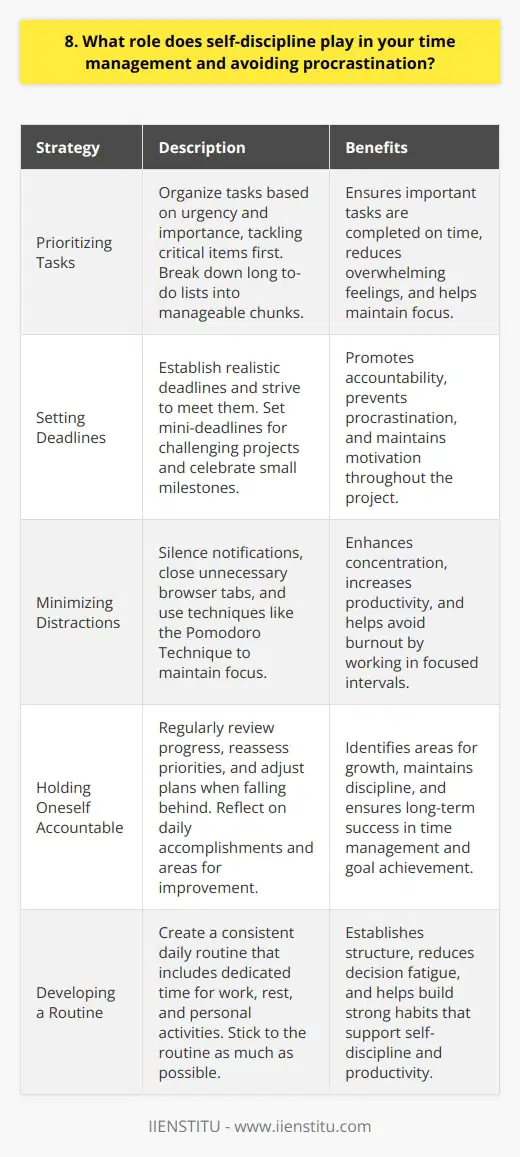
9. How do you create a work environment that minimizes distractions and promotes productivity?
To create a work environment that minimizes distractions and promotes productivity, I focus on three key areas:
Establishing clear boundaries and expectations
I communicate openly with my team about the importance of focused work time. We agree on specific "do not disturb" hours where interruptions are kept to a minimum, barring emergencies. During these periods, we silence notifications and avoid unnecessary meetings or chitchat.
Optimizing the physical workspace
I believe in the power of a well-organized, comfortable workspace. I encourage my team to declutter their desks, invest in ergonomic furniture, and personalize their area with plants or inspiring visuals. We also designate quiet zones for deep work and collaborative spaces for brainstorming sessions.
Leading by example and promoting self-care
As a manager, I strive to model good habits. I prioritize my own tasks, avoid multitasking, and take regular breaks to recharge. I also emphasize the importance of self-care to my team. We discuss strategies for managing stress, maintaining work-life balance, and staying physically and mentally healthy.
Ultimately, creating a productive environment is an ongoing process that requires commitment from everyone involved. By setting clear guidelines, fostering open communication, and prioritizing well-being, I aim to help my team do their best work while minimizing distractions.

10. What strategies do you use to maintain a healthy work-life balance and avoid burnout?
Maintaining a healthy work-life balance is crucial for both personal well-being and professional success. Over the years, I've developed several strategies to avoid burnout and ensure that I'm at my best, both at work and in my personal life.
Setting Clear Boundaries
One of the most important things I've learned is to set clear boundaries between work and personal time. When I'm at work, I'm fully focused on my tasks and responsibilities, but when I leave the office, I make a conscious effort to disconnect and enjoy my personal life. This means avoiding checking work emails or taking work calls outside of business hours, unless it's an absolute emergency.
Prioritizing Self-Care
I've also found that prioritizing self-care is essential for maintaining a healthy work-life balance. This includes things like regular exercise, healthy eating, and getting enough sleep. I try to schedule time for these activities just like I would for any other important appointment.
Hobbies and Interests
In addition, I make sure to carve out time for hobbies and interests outside of work. For me, that means going for hikes on weekends, practicing photography, and volunteering at a local animal shelter. Engaging in activities that I'm passionate about helps me recharge and brings a sense of fulfillment to my life.
Staying Organized
Finally, I've found that staying organized is key to avoiding burnout. I use tools like calendars and to-do lists to prioritize tasks, and I'm not afraid to delegate when necessary. By staying on top of my workload and managing my time effectively, I'm able to achieve a better balance between my professional and personal life.
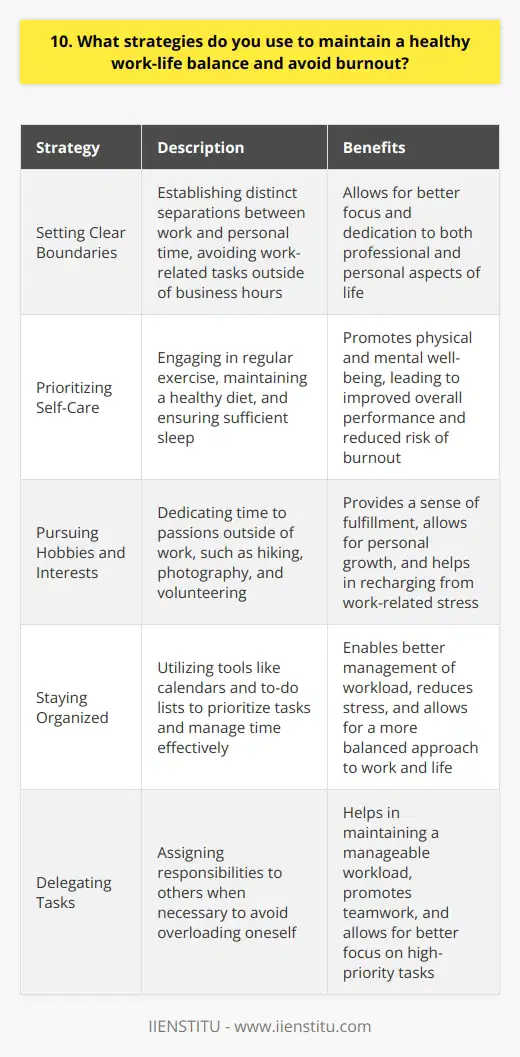
11. How do you handle interruptions and unexpected tasks without letting them derail your progress?
I've developed a system for handling interruptions and unexpected tasks that helps me stay focused and productive. First, I assess the urgency and importance of the new task. If it's critical, I'll tackle it right away. If not, I add it to my to-do list for later.
Prioritizing Tasks
Next, I prioritize my tasks based on deadlines and overall impact. I've found that breaking larger projects into smaller, manageable steps helps me make steady progress, even when unexpected things come up. I also communicate with my team and manager about my workload and any potential delays.
Staying Organized
Staying organized is key. I keep detailed notes and use project management tools to track my progress. This allows me to quickly jump back into a task after an interruption. I also set aside dedicated blocks of time for focused work on important projects.
Adapting to Change
Over time, I've learned to be flexible and adapt to changing priorities. I try to maintain a positive attitude and view interruptions as opportunities to problem-solve and collaborate with others. By staying calm and focused, I'm able to handle unexpected tasks without losing sight of my overall goals.
In my experience, the key to managing interruptions is having a clear plan, staying organized, and being adaptable. By following these strategies, I'm able to stay on track and deliver high-quality work, even in a fast-paced environment with competing demands.
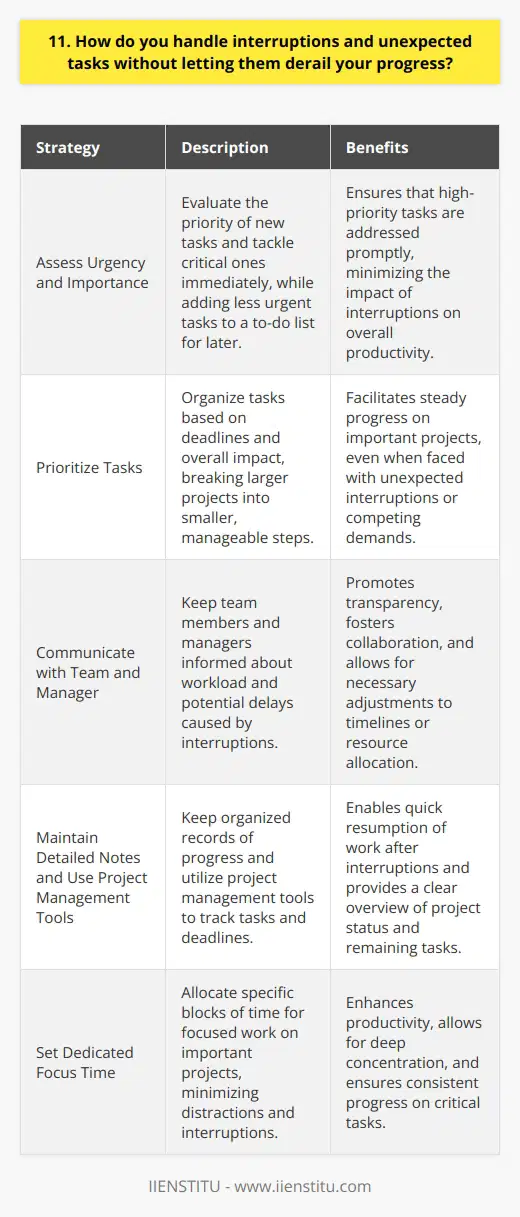
12. What methods do you use to estimate the time required for tasks and plan accordingly?
When estimating the time required for tasks and planning accordingly, I rely on a combination of methods. First, I break down the task into smaller, manageable steps to better understand the scope and complexity.
Leveraging Past Experience
I draw upon my past experiences with similar tasks to gauge how long each step might take. For example, when I was working on a website redesign project last year, I learned that gathering client requirements usually takes around 3-4 hours of meetings and follow-up emails.
Factoring in Buffer Time
Next, I add buffer time to account for unexpected delays or challenges that may arise. I've found that adding a 20-30% buffer to my initial time estimate helps me stay on track and manage expectations.
Collaborating with Team Members
I also collaborate with team members to get their input on time estimates, especially if they have more experience with certain aspects of the task. Last month, I worked closely with our lead developer to estimate the time needed for coding and testing a new feature. Her insights were invaluable in creating a realistic timeline.
Regularly Reviewing Progress
Throughout the project, I regularly review progress and adjust my time estimates as needed. I find that having weekly check-ins with the team helps us identify any potential roadblocks early on and make necessary adjustments to our plan.
By using these methods, I'm able to create realistic timelines, manage my workload effectively, and deliver high-quality results on schedule.
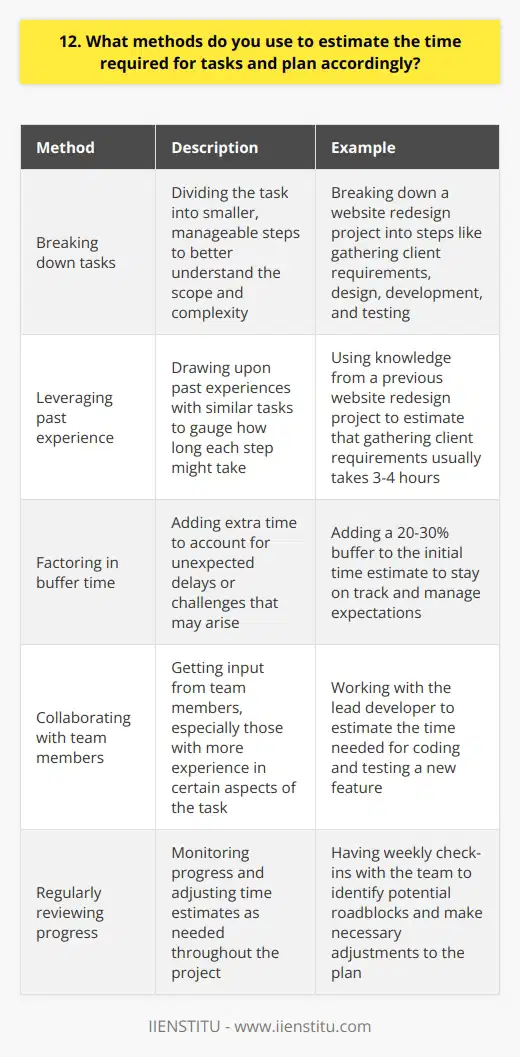
13. How do you stay accountable to your goals and commitments?
I stay accountable to my goals and commitments by setting clear objectives and breaking them down into manageable tasks. This allows me to focus on what needs to be done each day and week, ensuring steady progress towards the larger goal.
Tracking Progress
To hold myself accountable, I regularly track my progress using tools like calendars, to-do lists, and project management software. Seeing what I've accomplished and what still needs attention keeps me motivated and on target.
I'm also a big believer in the power of accountability partners. Having someone to check in with, whether a colleague, mentor, or friend, provides an extra layer of support and encouragement. We celebrate each other's wins and brainstorm solutions when facing challenges.
Staying Focused and Adaptable
Of course, life doesn't always go according to plan. When unexpected obstacles arise, I try to stay focused on the end goal while remaining flexible in my approach. If something isn't working, I'm not afraid to pivot and try a new strategy.
At the end of the day, accountability is about integrity - doing what I say I'll do, even when it's tough. It's a value I strive to embody in all aspects of my life, from my professional commitments to my personal relationships. By staying true to my word and putting in the necessary effort, I've found that I can achieve great things, one step at a time.
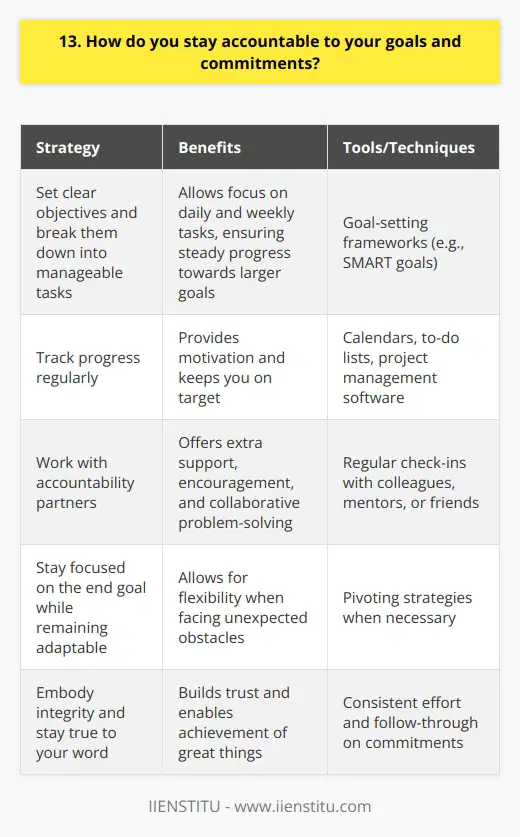
14. What techniques do you use to maintain motivation and momentum when working on long-term projects?
When working on long-term projects, I rely on several techniques to maintain motivation and momentum:
Breaking Down Goals
I break down the project into smaller, manageable tasks. This helps me focus on one step at a time. Completing each task gives me a sense of progress and keeps me motivated.
Celebrating Milestones
I set milestones along the way and celebrate each one when I reach it. Last year, while working on a six-month project, I treated myself to a nice dinner out after finishing the first major phase. Acknowledging my progress helps me stay positive and driven.
Staying Organized
I keep myself organized with to-do lists, calendars, and project management tools. Seeing everything laid out clearly prevents me from feeling overwhelmed. I can prioritize what needs to get done and when.
Taking Breaks
I make sure to take regular breaks to avoid burnout. Stepping away from my work for a bit helps me recharge. I like to go for a quick walk or chat with coworkers. I come back refreshed and ready to dive in again.
Finding Accountability Partners
I find it motivating to have others to check in with about my progress. Whether it's a colleague or manager, knowing someone else is invested in the project's success pushes me to keep going. We can brainstorm solutions if I get stuck.
By using these techniques, I'm able to keep my energy and enthusiasm high, even when working on lengthy, complex projects. I've found they help me deliver quality work while avoiding the slumps that can come with long-term assignments.
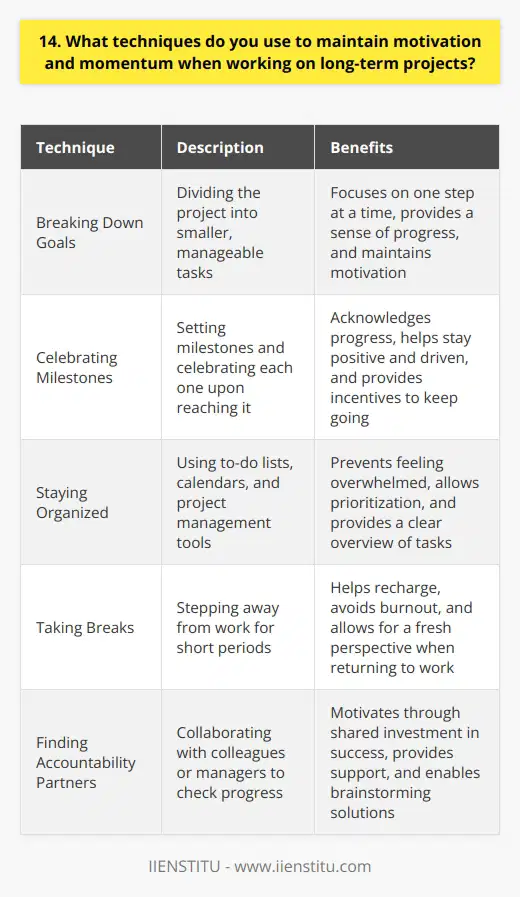
15. How do you leverage your peak productivity hours to tackle important tasks?
I am highly aware of my peak productivity hours and leverage them to tackle important tasks effectively. In the morning, after a healthy breakfast, I feel most energized and focused. This is when I schedule my most challenging and critical tasks.
Prioritizing Tasks
I prioritize my to-do list based on urgency and importance. The most pressing and significant tasks are tackled first during my peak hours. This ensures that I make substantial progress on projects that matter most.
Creating the Right Environment
To maximize my productivity during peak hours, I create a conducive work environment. I minimize distractions by turning off notifications, finding a quiet space, and having all necessary tools and resources at hand. This helps me maintain a sharp focus and work efficiently.
Taking Regular Breaks
While I aim to make the most of my peak hours, I also recognize the importance of taking regular breaks. Short breathers help me recharge, maintain clarity, and prevent burnout. I use techniques like the Pomodoro method to work in focused intervals and take timely breaks.
Collaborating with Others
During peak hours, I also prioritize tasks that involve collaboration with colleagues. I schedule meetings, brainstorming sessions, and discussions during this time to ensure effective communication and problem-solving. Collaborating when I'm at my best leads to more productive teamwork.
By strategically leveraging my peak productivity hours, I am able to consistently deliver high-quality work and meet important deadlines. I believe in working smarter, not just harder, to achieve optimal results in my role.
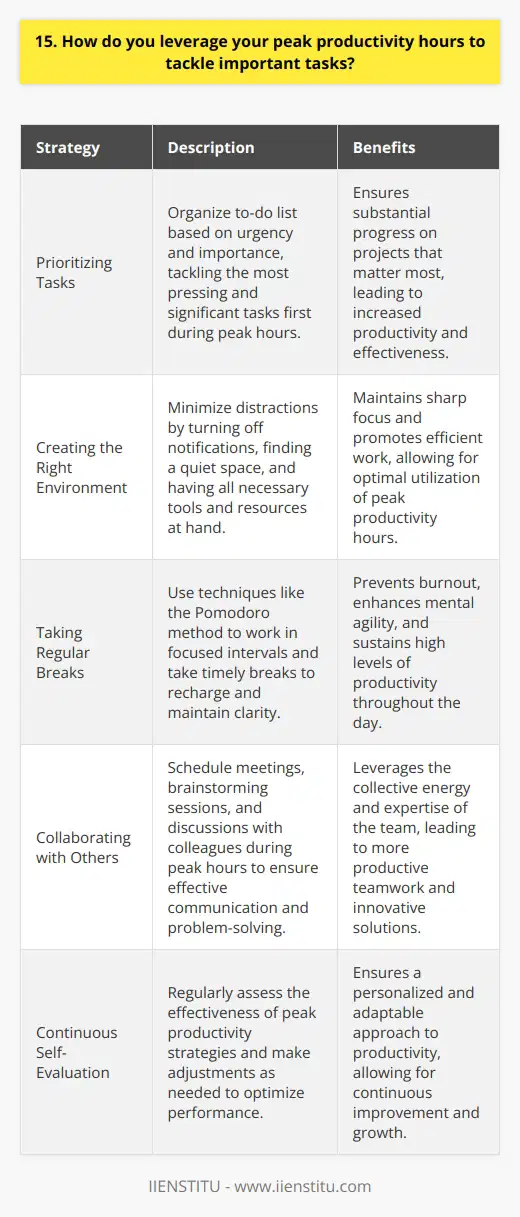
16. What strategies do you employ to avoid multitasking and focus on one task at a time?
When it comes to avoiding multitasking and focusing on one task at a time, I have a few strategies that help me stay on track.
Prioritize and Plan
First, I prioritize my tasks based on importance and urgency. I make a to-do list and tackle the most critical items first. By having a clear plan, I can focus on one thing at a time without getting overwhelmed or distracted.
Eliminate Distractions
Next, I eliminate distractions as much as possible. I turn off notifications on my phone and computer, close unnecessary tabs, and find a quiet workspace. When I worked from home during the pandemic, I even invested in noise-canceling headphones to block out background noise and help me concentrate.
Break Tasks into Smaller Steps
Another strategy I use is breaking big tasks into smaller, manageable steps. Instead of trying to do everything at once, I focus on one part at a time. This helps me avoid getting overwhelmed and allows me to make steady progress.
Take Breaks
I also make sure to take breaks when needed. If I feel my focus starting to drift, I'll step away for a few minutes to stretch, grab a snack, or just clear my head. Taking short breaks actually helps me be more productive in the long run.
Stay Organized
Finally, I try to stay organized and keep my workspace tidy. A cluttered desk can be distracting and make it harder to focus. By keeping things neat and having a designated place for everything, I can minimize distractions and stay on task.
Overall, avoiding multitasking and focusing on one thing at a time takes practice and discipline. But by using these strategies, I've been able to improve my productivity and deliver better results in my work.
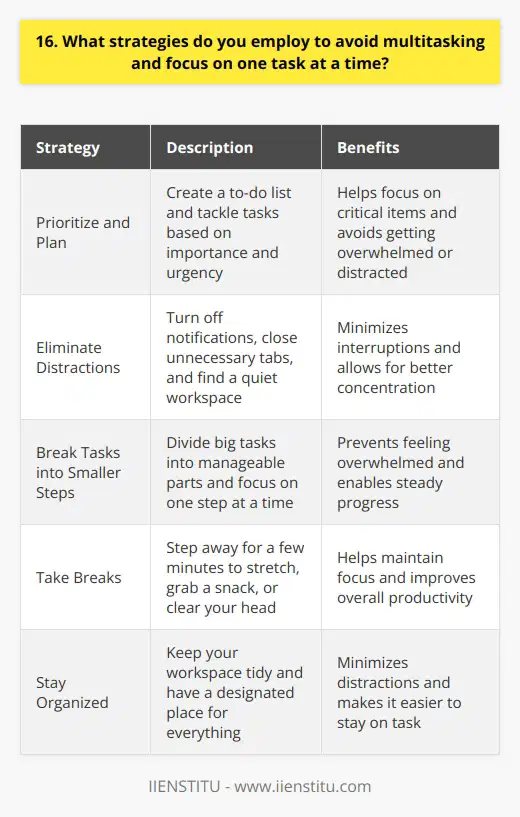
17. How do you use rewards or incentives to motivate yourself to complete tasks?
I find that setting clear goals and milestones is a powerful way to motivate myself to complete tasks. When I break a large project into smaller, manageable steps, it feels less overwhelming and more achievable. Celebrating each milestone along the way helps me maintain momentum and stay engaged.
The Power of Positive Self-Talk
Another strategy I use is positive self-talk. I remind myself of my strengths, past successes, and the importance of the task at hand. When I encounter obstacles or setbacks, I reframe them as opportunities for growth and learning. This mindset shift keeps me motivated and resilient.
Rewarding Myself for a Job Well Done
I also believe in rewarding myself for a job well done. When I complete a challenging task or reach a significant milestone, I treat myself to something I enjoy, like a favorite meal, a movie night with friends, or a relaxing afternoon in nature. These rewards give me something to look forward to and make the hard work feel worthwhile.
Accountability and Support
Finally, I find that accountability and support from others can be a powerful motivator. When I share my goals with a trusted friend, colleague, or mentor, I feel more committed to following through. Their encouragement and guidance help me stay on track and push through tough times.
In the end, motivation is a very personal thing. What works for me might not work for everyone, but I've found that a combination of clear goals, positive self-talk, meaningful rewards, and a supportive network helps me stay motivated and achieve my best work.
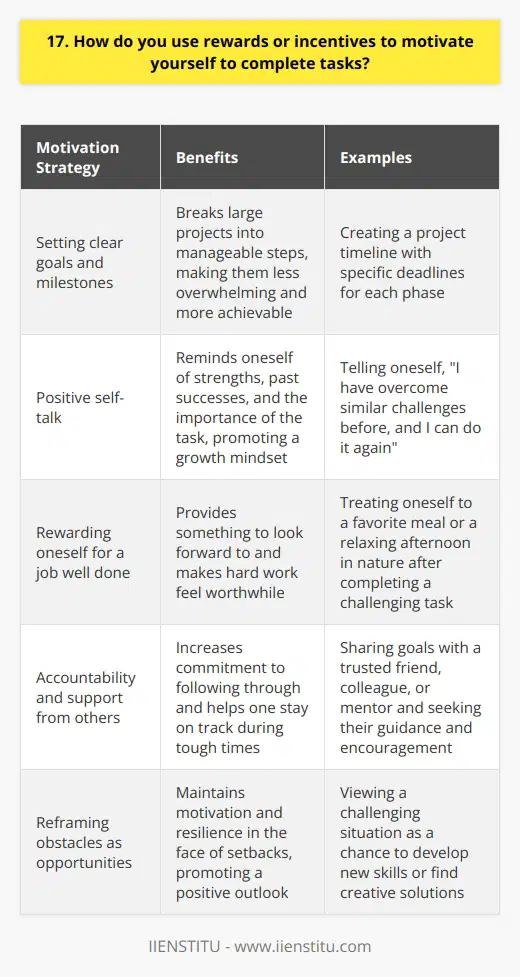
18. What techniques do you use to avoid decision fatigue and maintain mental clarity throughout the day?
To maintain mental clarity and avoid decision fatigue, I use several techniques throughout the day. First and foremost, I prioritize my tasks based on importance and urgency. This helps me focus on what matters most and conserve mental energy for critical decisions.
Minimizing Distractions
I minimize distractions by closing unnecessary browser tabs, silencing notifications, and finding a quiet workspace. This allows me to fully concentrate on the task at hand without getting sidetracked by less important matters. When I need to make important decisions, I give myself dedicated time to think things through without rush or pressure.
Taking Breaks
I've found that taking regular breaks is essential for maintaining mental clarity. Every hour or so, I step away from my desk, stretch, and let my mind wander. Sometimes I'll go for a quick walk outside to get some fresh air and natural light. These short mental breaks help me recharge and approach problems with a fresh perspective.
Staying Organized
Keeping my workspace and digital files organized is another key strategy I use. When everything has its place, I spend less mental energy trying to locate what I need. I rely on to-do lists, project management tools, and a clean desk policy. The less clutter, the more I can focus on making good decisions.
Fueling My Body and Brain
Finally, I make sure to fuel my body and brain with nutritious foods, plenty of water, and sufficient sleep. When I'm well-rested and properly nourished, I'm sharper, more focused, and better equipped to handle whatever challenges come my way. I've learned that self-care is key to peak mental performance.
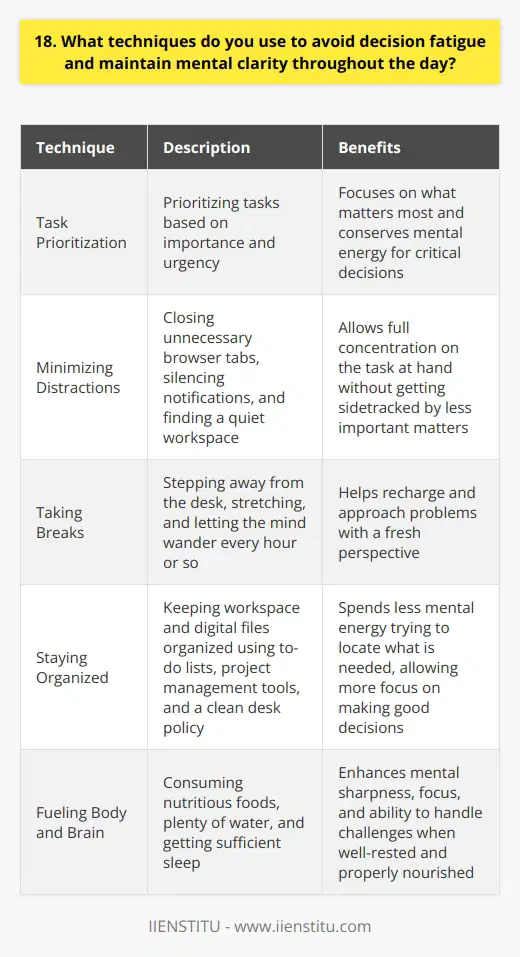
19. How do you prioritize self-care and breaks to prevent burnout and maintain productivity?
I believe that prioritizing self-care and taking regular breaks is essential for maintaining productivity and preventing burnout. In my experience, setting clear boundaries between work and personal time has been crucial for my well-being.
Setting Boundaries
I make sure to disconnect from work-related tasks and communication outside of designated work hours. This allows me to recharge and come back to work with a fresh perspective.
Engaging in Hobbies
During my breaks, I enjoy engaging in hobbies that bring me joy and help me relax. Whether it's going for a walk in nature, practicing yoga, or reading a book, these activities help me clear my mind and reduce stress.
Prioritizing Self-Care
I prioritize self-care by making time for activities that nourish my body and mind. This includes getting enough sleep, eating a balanced diet, and exercising regularly.
Mindfulness Practices
I've found that incorporating mindfulness practices, such as meditation or deep breathing exercises, helps me stay centered and focused throughout the day. Even taking a few minutes to practice mindfulness can make a big difference in my productivity and overall well-being.
Learning to Say No
I've learned that it's okay to say no to additional tasks or commitments when I'm feeling overwhelmed. By setting realistic expectations and communicating my limits, I can avoid taking on too much and prevent burnout.
Overall, I believe that prioritizing self-care and taking regular breaks is essential for maintaining a healthy work-life balance and achieving long-term success in any role.
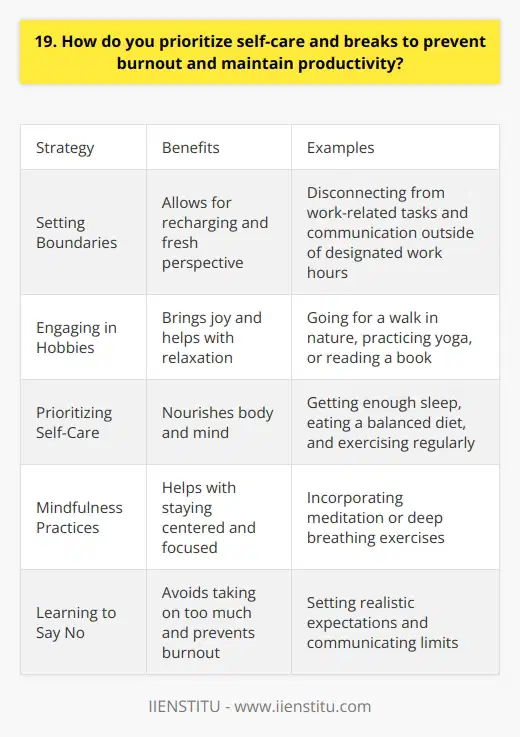
20. What strategies do you use to avoid procrastination when working remotely or independently?
When working remotely or independently, I have several strategies to avoid procrastination and stay productive:
Prioritize and Plan
I start each day by reviewing my tasks and prioritizing them based on importance and urgency. This helps me focus on what matters most and avoid getting sidetracked by less critical tasks. I break down larger projects into smaller, manageable steps and set realistic deadlines for each.
Create a Dedicated Workspace
Having a designated workspace, even if it's just a corner of my living room, puts me in the right mindset for work. I make sure it's comfortable, well-lit, and free from distractions. When I sit down at my desk, my brain knows it's time to get things done.
Minimize Distractions
I turn off notifications on my phone and computer to avoid getting pulled away from my work. If I need to, I use website blockers to prevent myself from mindlessly browsing social media or other time-wasting sites. I also communicate my work hours to family and friends, so they know when I'm available and when I need to focus.
Take Regular Breaks
It might seem counterintuitive, but taking short breaks actually helps me stay productive and avoid burnout. I step away from my desk every hour or so to stretch, grab a snack, or just rest my eyes. This helps me maintain my energy and focus throughout the day.
Hold Myself Accountable
I set goals for each day and week and hold myself accountable for meeting them. I track my progress using a simple spreadsheet or app, which gives me a sense of accomplishment and motivates me to keep going. If I'm struggling with a particular task, I reach out to a colleague or mentor for guidance and support.
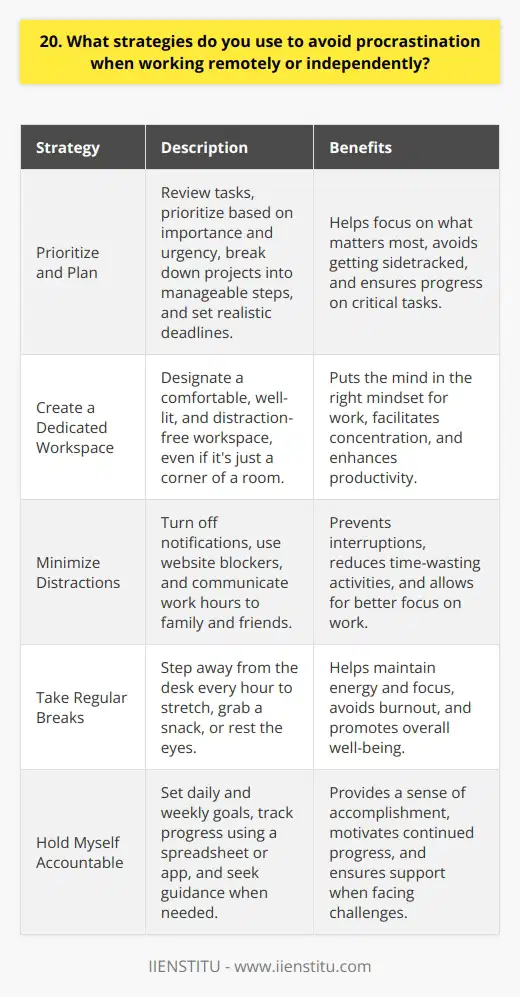
21. How do you break free from perfectionism and avoid letting it lead to procrastination?
I've found that the key to breaking free from perfectionism is to embrace the concept of "good enough." Striving for perfection can often lead to analysis paralysis, where you get stuck overthinking every detail and never actually make progress. Instead, I set realistic goals and deadlines for myself, and focus on taking action rather than getting bogged down in the pursuit of perfection.
Prioritize and Break Tasks Down
When faced with a daunting project, I break it down into smaller, manageable tasks. This helps me avoid feeling overwhelmed and procrastinating. I prioritize the most important aspects and tackle them first, rather than getting caught up in minor details that can be refined later.
Embrace Mistakes as Learning Opportunities
I've learned to view mistakes not as failures, but as valuable learning experiences. When I make a mistake, instead of beating myself up over it, I ask myself what I can learn from it and how I can improve next time. This mindset shift has helped me let go of perfectionism and be more willing to take risks and try new things.
Set Realistic Expectations
Another strategy I use is setting realistic expectations for myself. I recognize that perfection is often unattainable, and that's okay. I aim for excellence and continuous improvement, but I don't expect everything to be flawless. By setting realistic standards, I avoid getting discouraged and am more likely to stay motivated and productive.
In summary, breaking free from perfectionism requires a combination of prioritization, embracing mistakes, and setting realistic expectations. By focusing on progress over perfection, I'm able to avoid procrastination and achieve my goals more effectively.
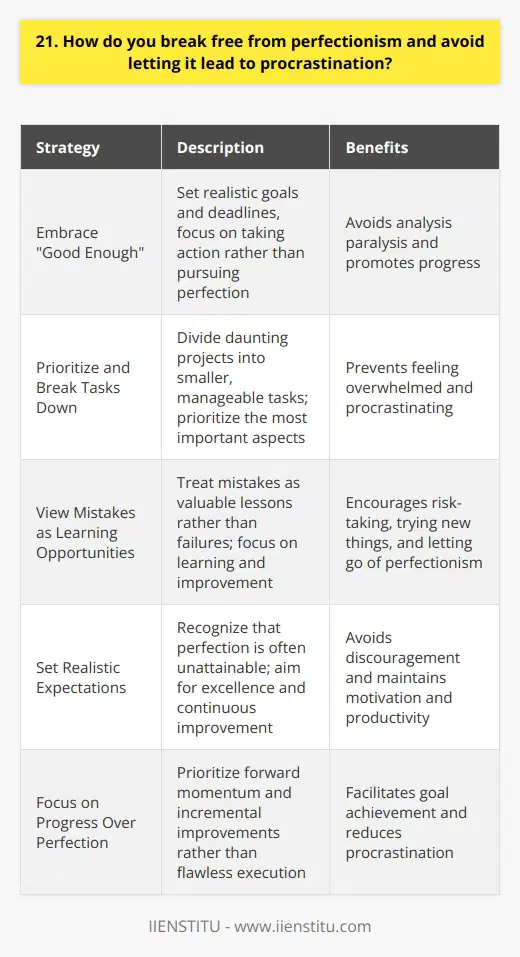
22. What methods do you use to track your progress and celebrate small wins along the way?
I believe that tracking progress and celebrating small wins is crucial for staying motivated and productive. Here are some methods I use:
Set Clear Goals and Milestones
I start by setting specific, measurable goals for each project. Then, I break them down into smaller milestones. This helps me focus on manageable tasks and see progress along the way.
Use a Project Management Tool
I rely on tools like Trello or Asana to organize my tasks, deadlines, and progress. Seeing those progress bars fill up gives me a real sense of accomplishment!
Celebrate Small Victories
Whenever I hit a milestone, I take a moment to acknowledge my hard work. It could be treating myself to a favorite snack or sharing the good news with a colleague. These little celebrations keep me energized.
Reflect on Lessons Learned
I also make time to reflect on what I've learned from each project. What worked well? What could I improve next time? Tracking these insights helps me grow professionally.
Communicate with My Team
Finally, I keep my team in the loop about my progress. We cheer each other on and offer support when needed. It's a great way to stay accountable and motivated!
In the end, tracking progress is all about staying organized, recognizing your efforts, and continuously improving. It's a skill I've honed over time, and I'm always looking for new strategies to try out.
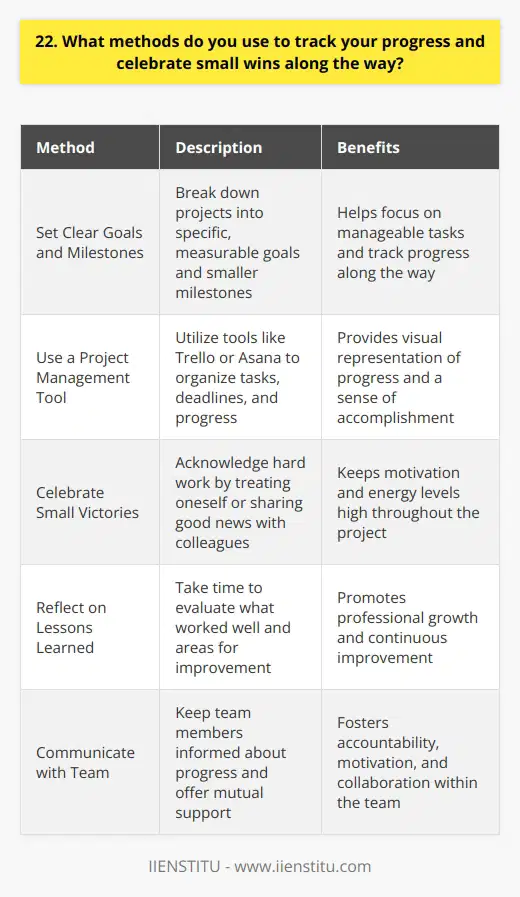
23. How do you handle setbacks or failures without letting them derail your productivity?
When faced with setbacks or failures, I strive to maintain a positive and proactive mindset. I believe that every challenge presents an opportunity for growth and learning.
Embracing a Growth Mindset
I view failures as temporary roadblocks rather than permanent defeats. By adopting a growth mindset, I focus on the lessons I can learn from each experience. I ask myself, "What can I do differently next time to achieve a better outcome?" This helps me stay motivated and keeps me moving forward.
Seeking Feedback and Support
When faced with a setback, I actively seek feedback from my colleagues and mentors. Their insights and perspectives help me identify areas for improvement and develop actionable plans to overcome the challenges I'm facing. I also lean on my support network for encouragement and guidance during difficult times.
Breaking Down Challenges
When a failure seems overwhelming, I break it down into smaller, manageable tasks. By tackling one piece at a time, I maintain my productivity and gradually work towards a solution. Celebrating small victories along the way helps me stay motivated and focused on the bigger picture.
Staying Resilient
I believe that resilience is key to handling setbacks effectively. I remind myself of past challenges I've overcome and the strengths I possess. By staying confident in my abilities and maintaining a determined attitude, I'm able to bounce back from failures more quickly and continue making progress towards my goals.
At the end of the day, I believe that setbacks and failures are inevitable parts of any journey. What matters most is how we respond to them. By embracing challenges as opportunities for growth, seeking support, breaking down obstacles, and staying resilient, I'm able to navigate setbacks without letting them derail my productivity or hinder my success.
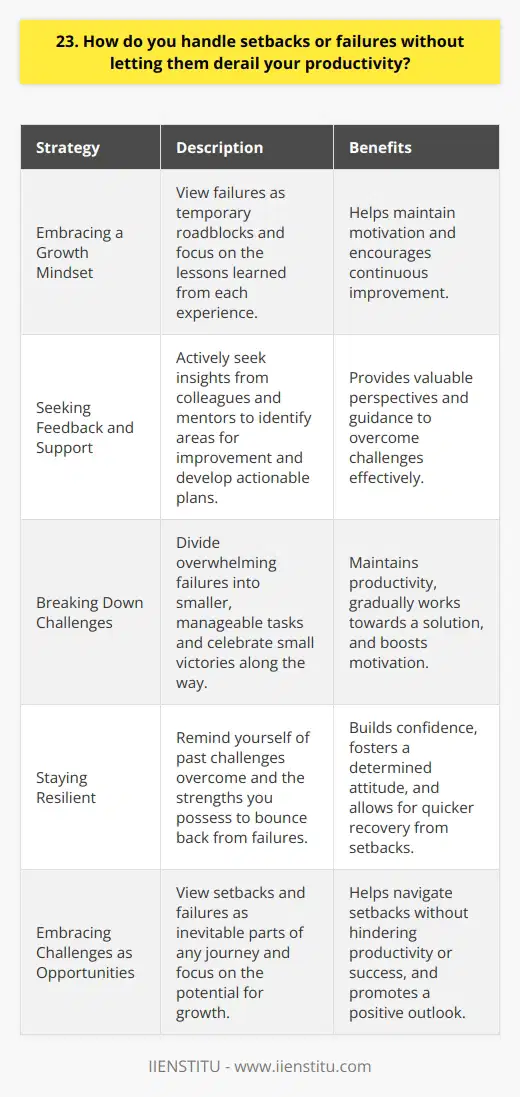
24. What techniques do you use to avoid analysis paralysis and make timely decisions?
When faced with the challenge of analysis paralysis, I rely on a few key techniques to make timely decisions:
Prioritize the most critical factors
I focus on the most important aspects of the decision and weigh them accordingly. This helps me avoid getting bogged down in minor details that won't significantly impact the outcome.
Set a realistic deadline
I give myself a reasonable timeline to gather information and make a choice. Having a deadline prevents me from endlessly deliberating and forces me to act.
Consult with trusted advisors
When I'm unsure, I reach out to colleagues or mentors whose opinions I value. Their insights often provide clarity and help me see the situation from different angles.
Trust my instincts
After carefully considering the facts, I listen to my gut feeling. I've learned that my intuition is usually right when it comes to making tough calls under pressure.
At my previous job, we had to decide whether to pursue a major client with demanding requirements. I prioritized our team's capacity and long-term goals, consulted with our top managers, and set a one-week deadline to make a final call. Ultimately, I trusted my instincts that the client wasn't a good fit, and my boss later thanked me for safeguarding our team from burnout. The experience taught me the importance of balancing thorough analysis with decisive action.
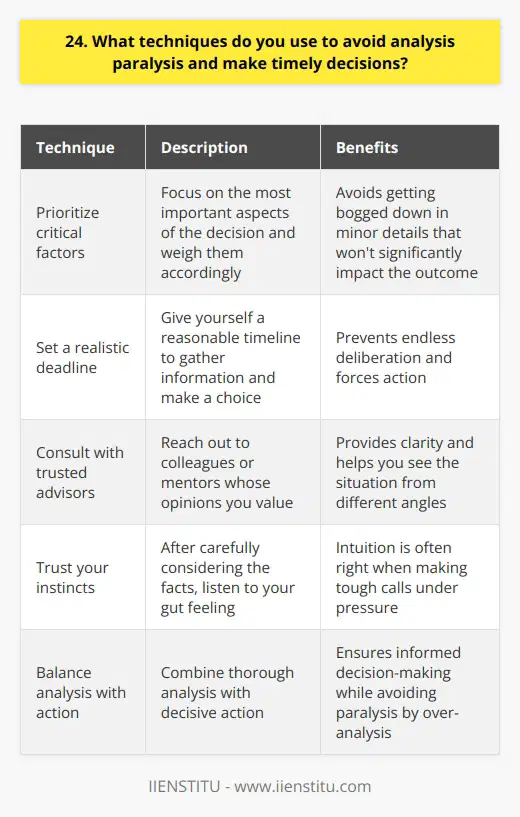
25. How do you leverage delegation or collaboration to manage your workload effectively?
I believe that effective delegation and collaboration are essential for managing a heavy workload. In my current role, I regularly delegate tasks to team members based on their skills and availability. This allows me to focus on high-priority items while ensuring that all work is completed efficiently.
Communicating Expectations
When delegating, I clearly communicate my expectations and provide any necessary resources or guidance. I also make myself available to answer questions and provide support as needed. This helps to ensure that tasks are completed accurately and on time.
Collaborating with Colleagues
In addition to delegation, I actively collaborate with colleagues to tackle complex projects. By bringing together diverse perspectives and skill sets, we can often find innovative solutions to challenges. I enjoy brainstorming ideas with my team and working together to achieve our goals.
Prioritizing and Planning
To manage my own workload, I prioritize tasks based on urgency and importance. I create daily and weekly to-do lists to stay organized and on track. When unexpected issues arise, I reassess my priorities and adjust my plan accordingly. By staying flexible and focused, I'm able to consistently meet deadlines while maintaining a high standard of work.
Overall, I believe that delegation and collaboration are powerful tools for managing a heavy workload. By leveraging the strengths of my team and staying organized, I'm able to consistently deliver strong results.
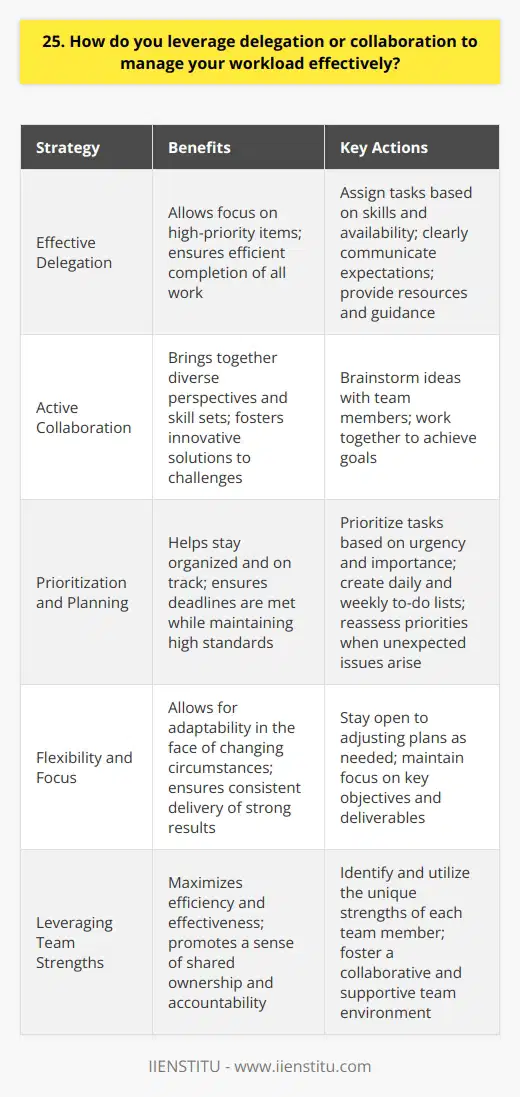
26. What strategies do you use to avoid procrastination when faced with overwhelming or complex tasks?
When faced with overwhelming or complex tasks, I employ several strategies to avoid procrastination and stay productive.
Break It Down
First, I break the task into smaller, manageable chunks. This makes it less daunting and easier to tackle.
I create a checklist of subtasks and focus on completing one at a time. Small wins build momentum.
Set Deadlines
Next, I set realistic deadlines for each subtask. This creates a sense of urgency and keeps me on track.
I hold myself accountable by sharing my deadlines with colleagues or using a task management app for reminders.
Eliminate Distractions
To stay focused, I eliminate distractions like social media, email notifications, and chatty coworkers during dedicated work time.
I put on noise-canceling headphones, play instrumental music, and find a quiet workspace to help me concentrate better.
Take Breaks
Surprisingly, taking regular breaks actually boosts my productivity. I step away every 60-90 minutes to recharge.
During breaks, I take a quick walk, do stretches, or chat with a colleague. This prevents burnout.
Start with the Hardest Part
Lastly, I tackle the hardest or least appealing part of the task first when my energy is highest.
Once I get over that initial hurdle, the rest seems more manageable. Progress motivates me to keep going.
By employing these anti-procrastination strategies, I'm able to stay organized, motivated, and productive, even when facing complex projects.
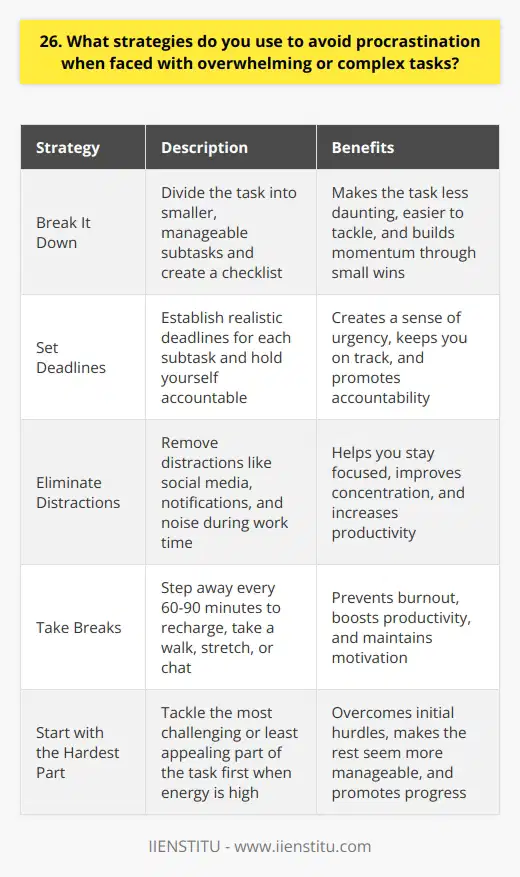
27. How do you create a sense of urgency and maintain a proactive mindset?
Take Initiative and Ownership
I believe creating a sense of urgency starts with taking personal initiative. When I recognize an important task or goal, I take ownership of it. I proactively communicate with my team about what needs to be done and volunteer to lead the effort. Taking initiative demonstrates that you view the work as a top priority.
Set Clear Goals and Timelines
To maintain urgency, I establish clear, ambitious yet achievable goals and timelines. I break large projects into smaller milestones. Setting frequent checkpoints creates a constant sense of forward momentum. It also allows the team to track progress and quickly identify any roadblocks or delays. Frequent status updates keep everyone aligned and accountable.
Anticipate Obstacles and Adapt
Unexpected challenges will inevitably arise in any complex project. I've learned that the key is to anticipate potential issues and develop contingency plans. By proactively identifying risks, you can adapt and pivot quickly when problems occur. This agility and resourcefulness is essential for maintaining progress toward the end goal, even in the face of setbacks.
Rally the Team
Finally, I strive to be a positive influence on those around me. I aim to inspire and motivate colleagues with my own sense of enthusiasm, dedication and confidence. When morale is high and everyone feels invested, creating a shared sense of urgency comes naturally. By setting an example of proactive optimism, you can rally your team to tackle challenges head-on and deliver outstanding results on time.
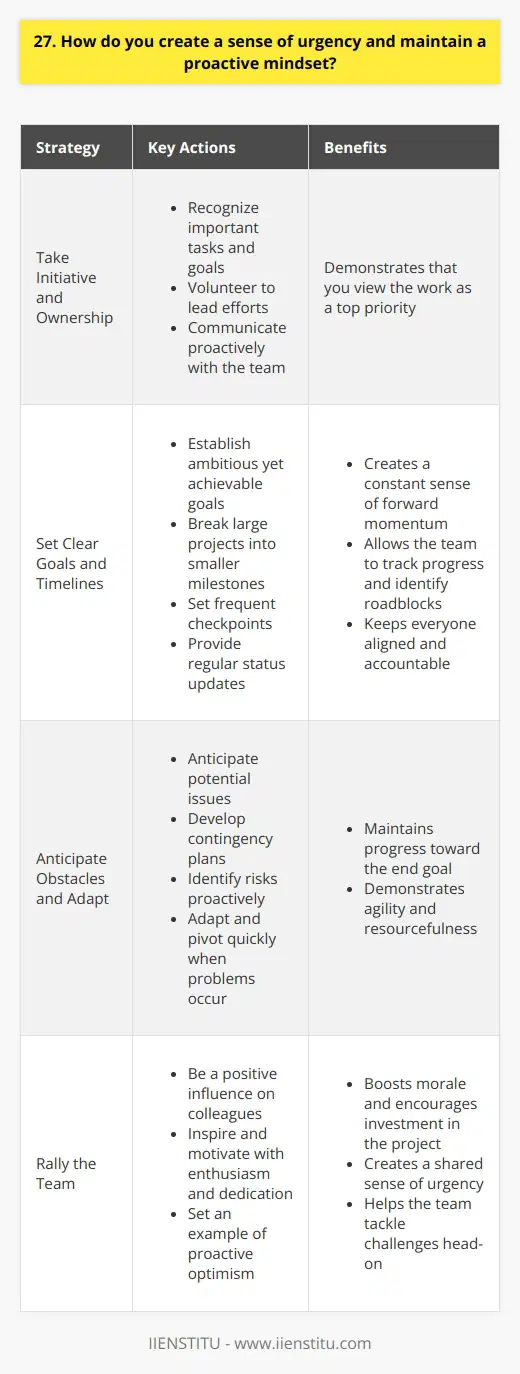
28. What techniques do you employ to avoid procrastination caused by fear of failure or success?
When faced with the fear of failure or success, I employ several techniques to avoid procrastination and stay productive.
Break Tasks into Manageable Steps
I break large projects into smaller, more manageable steps. This helps me focus on one task at a time and not get overwhelmed by the big picture. When I complete each step, I feel a sense of accomplishment that motivates me to keep going.
Set Realistic Goals and Deadlines
I set realistic goals and deadlines for myself. I consider my abilities and the time I have available. If I set unrealistic expectations, I'm more likely to procrastinate out of fear of failure. By setting achievable goals, I build confidence and momentum.
Practice Positive Self-Talk
When negative thoughts creep in, I practice positive self-talk. I remind myself of past successes and my capabilities. I tell myself that failure is a learning opportunity, not a reflection of my worth. By reframing my thoughts, I reduce anxiety and increase motivation.
Seek Support and Accountability
I reach out to colleagues, mentors, or friends for support and accountability. Sharing my goals and fears with others helps me feel less alone and more encouraged. Knowing that someone is cheering me on and holding me accountable keeps me on track.
Take Breaks and Practice Self-Care
I prioritize self-care and take breaks when needed. When I'm feeling overwhelmed or stuck, I step away from the task and do something enjoyable or relaxing. Taking care of my physical and mental well-being helps me approach challenges with a clearer mind and renewed energy.
By employing these techniques, I'm able to manage my fear of failure or success and avoid procrastination. I stay focused, motivated, and productive, even when faced with challenging tasks or projects.
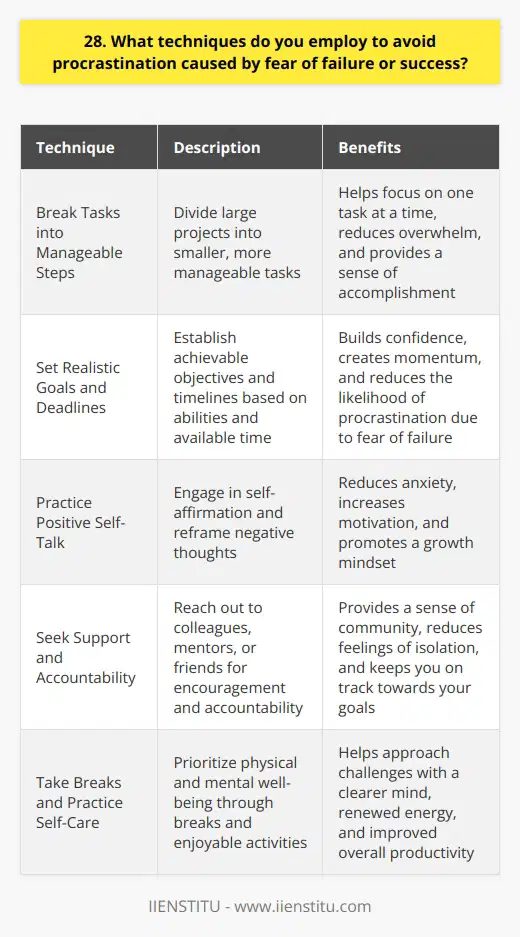
29. How do you use time-blocking or scheduling to ensure you allocate sufficient time for important tasks?
I rely on a combination of time-blocking and scheduling to ensure I allocate sufficient time for important tasks. Each day, I review my to-do list and prioritize the most critical items that require my attention. Then, I block out specific chunks of time on my calendar dedicated solely to those tasks.
Benefits of Time-Blocking
I've found that time-blocking helps me stay focused and avoid distractions. When I know I have a designated time slot for a particular task, I'm less likely to procrastinate or get sidetracked by less important activities. It's like making an appointment with myself to get things done!
Flexibility is Key
Of course, unexpected things can pop up throughout the day. That's why I build some flexibility into my schedule. I leave some buffer time between tasks to handle any urgent matters that may arise. And if I finish a task early, I can always move on to the next item on my list.
Reflecting on Progress
At the end of each day, I take a few minutes to reflect on my progress. Did I accomplish what I set out to do? If not, what obstacles got in the way? This helps me adjust my time-blocking strategy for the next day and ensures I'm always making progress on my most important goals.
Overall, I've found that a combination of time-blocking and flexible scheduling is the key to staying organized and productive. It's a simple but powerful tool that helps me make the most of every day.
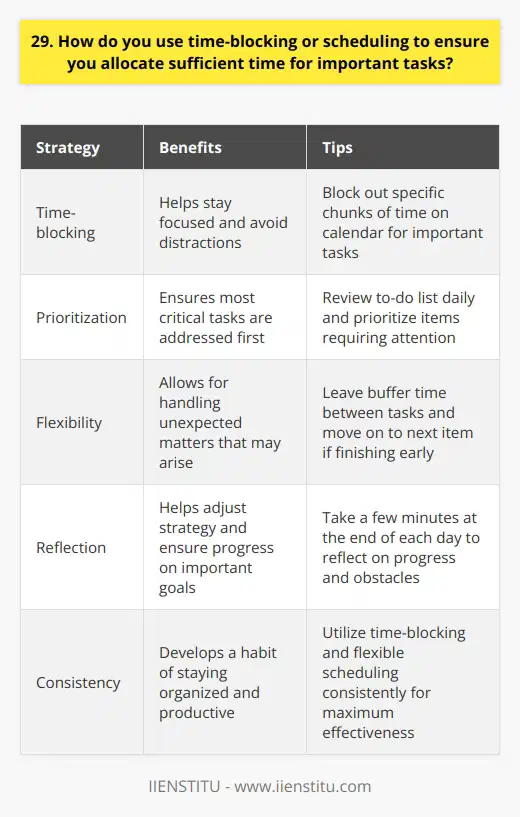
30. What methods do you use to reflect on your productivity and identify areas for improvement?
I have several methods that I use to reflect on my productivity and identify areas for improvement:
Regularly reviewing my progress
I make it a habit to review my progress on tasks and projects every week. This helps me stay on track and catch any issues early on. I ask myself what went well, what challenges I faced, and what I could do differently next time.
Seeking feedback from others
Getting an outside perspective is invaluable for identifying blind spots in my work. I proactively ask for feedback from my manager, colleagues, and clients. Even if it's not all positive, I view constructive criticism as an opportunity to learn and grow.
For example, last year a client pointed out that my emails could be more concise. Since then, I've focused on streamlining my communications. The client noticed the improvement and complimented my efficiency.
Analyzing metrics and data
I'm a believer in making data-driven decisions. Whenever possible, I look at relevant metrics to assess my productivity objectively. This could be anything from sales numbers to project timelines. The insights help me pinpoint what's working and what I need to adjust.
By using a combination of these methods, I'm able to continuously reflect on my performance and make targeted improvements. I find the process both challenging and rewarding - there's always room to learn and level up my skills. Ultimately, being proactive about self-improvement allows me to deliver better results and grow professionally.
